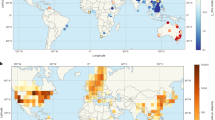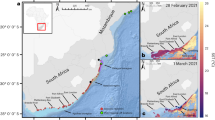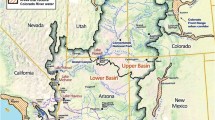Abstract
THE concentration of mercury in aquatic organisms is quite high relative to that in the surroundings but the exact mechanism by which this effect occurs is not known. Generally, higher mercury levels in the environment are reflected in the amount found in protoplasm. Mercury levels in rivers and lakes have increased markedly as a result of industrial discharges; thus, there is a proportionality between mercury concentrations in fishes and in waters, it is possible, using permissible mercury concentrations in fish tissue as a guide (Japan 0.4, US 0.5 p.p.m.), to make recommendations for acceptable mercury levels in lakes and rivers. I have found no reports regarding this relationship.
This is a preview of subscription content, access via your institution
Access options
Subscribe to this journal
Receive 51 print issues and online access
$199.00 per year
only $3.90 per issue
Buy this article
- Purchase on Springer Link
- Instant access to full article PDF
Prices may be subject to local taxes which are calculated during checkout
Similar content being viewed by others
References
Matsunaga, K., Mizushorigijitsu, 15, 431 (1974).
Matsunaga, K., Takahashi, T., and Nishimura, M., Mizushorigijitsu, 15, 1053 (1974).
Author information
Authors and Affiliations
Rights and permissions
About this article
Cite this article
MATSUNAGA, K. Concentration of mercury by three species of fish from Japanese rivers. Nature 257, 49–50 (1975). https://doi.org/10.1038/257049a0
Received:
Accepted:
Published:
Issue Date:
DOI: https://doi.org/10.1038/257049a0
This article is cited by
-
Mercury bioaccumulation in organisms from three Puerto Rican estuaries
Environmental Monitoring and Assessment (1992)
-
Estimation of variation of mercury concentration in the oceans during the last several decades
Journal of the Oceanographical Society of Japan (1976)
Comments
By submitting a comment you agree to abide by our Terms and Community Guidelines. If you find something abusive or that does not comply with our terms or guidelines please flag it as inappropriate.



